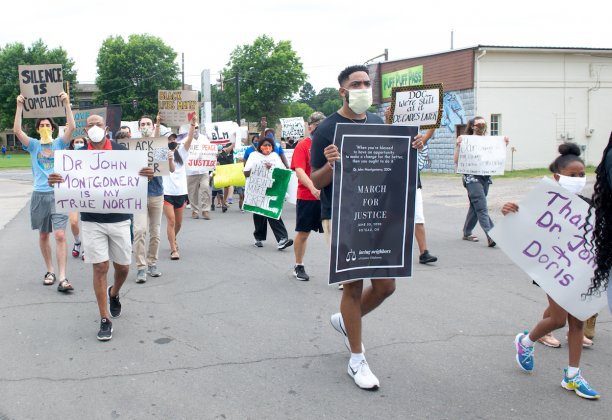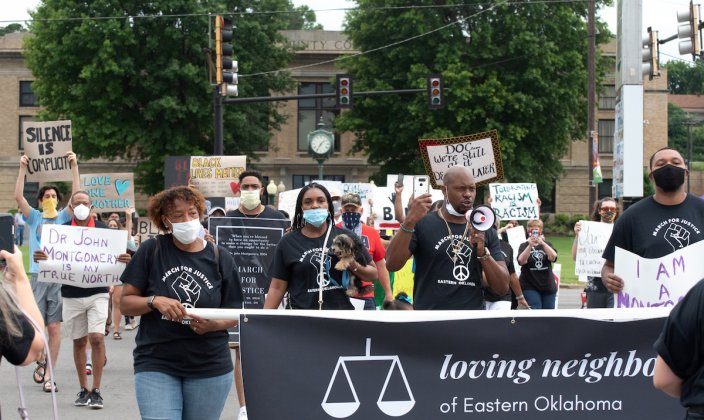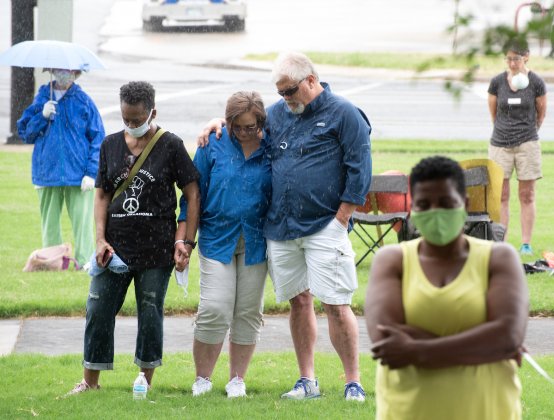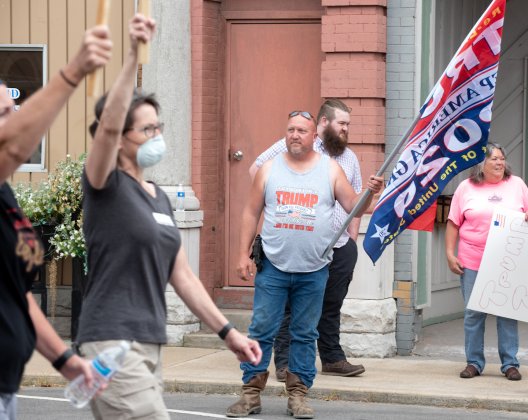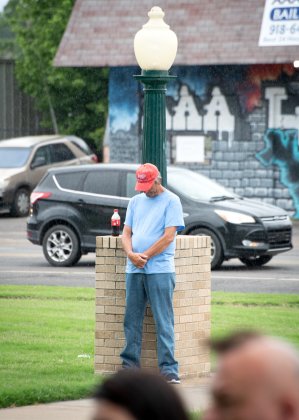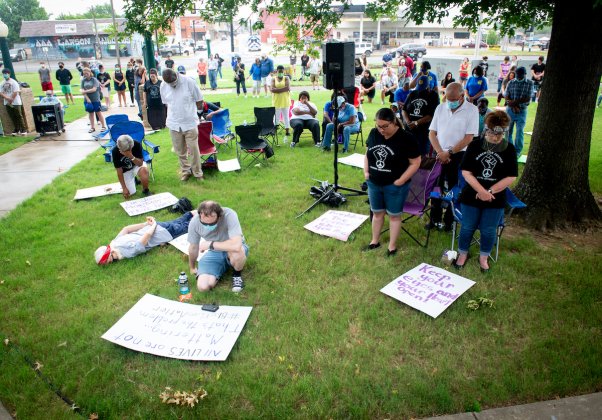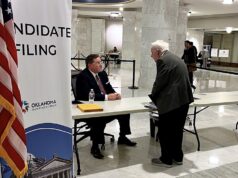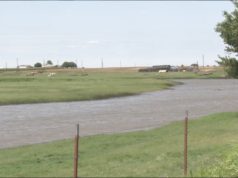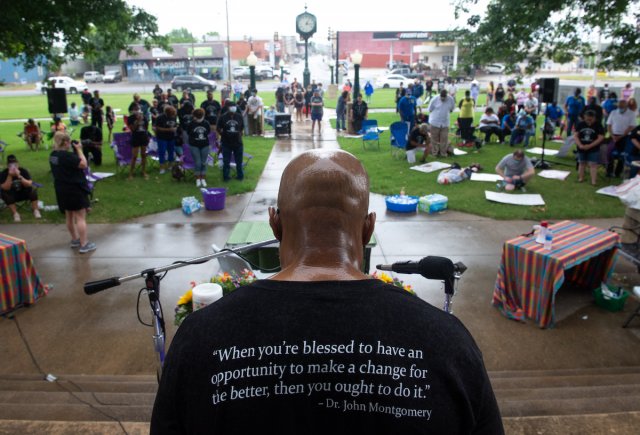

POTEAU — When Ladell Phillips was a little girl, her mother would shop in the stores on Dewey Avenue in downtown Poteau. The shopkeepers would welcome her mother through the front door.
Her mother was half Choctaw and half white.
But when Phillips and her siblings went to shop with their father at the same stores, they were required by shopkeepers to go around back to the alley and enter through stock rooms.
Her father was African-American.
“It would hurt my feelings because they would tell my dad he would have to go back through the alley through the back door,” Phillips recalled this weekend. “So we would have to go through the alley with my dad where all the garbage was.”
On Saturday, the 76-year-old Phillips joined about 120 local residents, mostly white, in a march down that same street carrying signs and singing chants that have become familiar to those attending Black Lives Matter protests in large American cities.
Only this time it was in Poteau, Oklahoma — population 8,520 and the seat of LeFlore County.
Located south of I-40 along the Arkansas border, Poteau is in that part of the state long nicknamed “Little Dixie” for its turn-of-the-century beginnings when white migration from mostly southern states into the Choctaw Nation brought with it certain traditions of the Deep South, including racial prejudice.
Phillips and other older members of the local Black community still remember a particular tree that once stood in nearby Heavener. They called it the “hanging tree,” not because it was where a court’s capital punishment was administered, but rather because it was where Black people were lynched by white vigilantes during the first half of the 20th century.
“The old people then would tell us, ‘Change is going to come. Just wait. Change is going to come,’” Phillips said. “But over the years, we were thinking, ‘It’s not changing.’ But seeing this today, well, change is coming. Change is here and now. It should have been here years ago, but I’m proud that everybody turned out today to represent that Black lives matter, because it does. It does.”
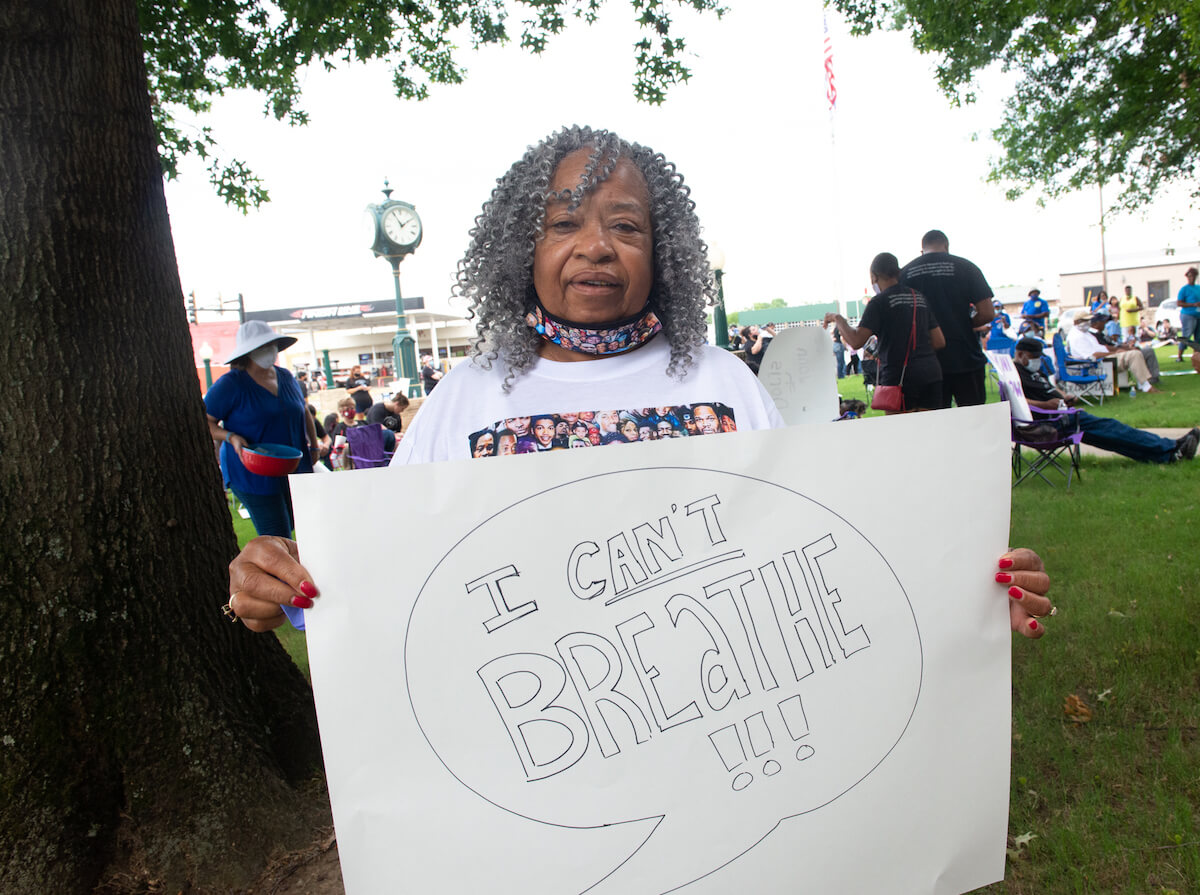
One might say the Poteau March for Justice brought the Black Lives Matter movement to a small town in southeastern Oklahoma.
But, in truth, the movement in Poteau came from within. The rally was organized by people like Kimberlyn Carpenter, a white 19-year-old college student from nearby Wister. Her plans were met with two kinds of local reactions.
“Positive and negative. I knew I would get some negative reaction, honestly,” Carpenter said. “It’s a controversial thing — but I don’t think it should be because it’s human rights. I knew I would get some backlash. Some people were really mean, but it’s worth it.”
Carpenter said she was very happy with the turnout for the rally and march, which was publicized on social media by the Loving Neighbors of Eastern Oklahoma organization.
“If one person learns something from this or realizes what’s been going on, then that’s what matters,” Carpenter said. “I’m pleased anyone is here.”
‘It pulls at my heart, Poteau’
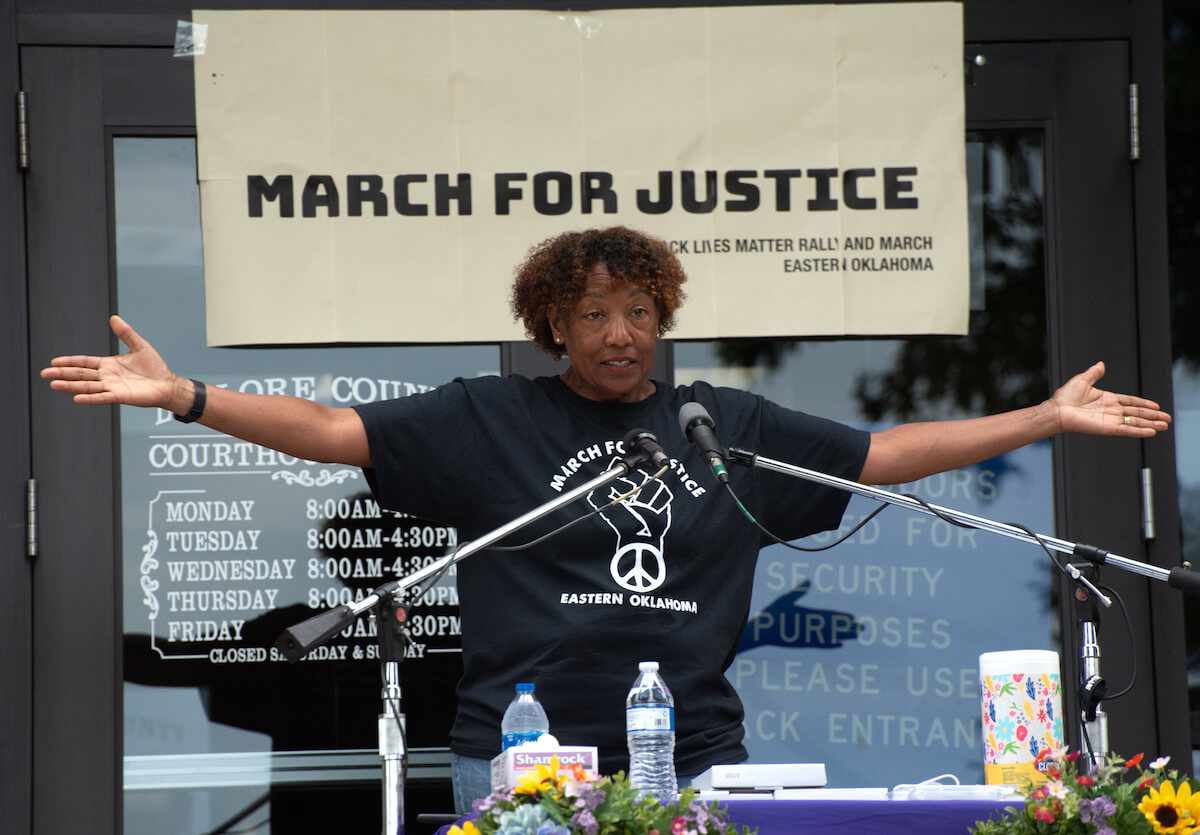
The event had special significance to Poteau, whose school was one of the first high schools in the state to become integrated in 1955. That happened in large part due to the efforts of a local veterinarian, Dr. John Montgomery.
In 1951, he was the only veterinarian in the Poteau River Valley. And he was Black — the grandson of a slave.
Montgomery, who died in 2014, is seen locally as the person most credited for bringing attention to racial injustice to the mostly white community in the 1950s. He convinced the local school board to integrate Poteau Public Schools before court decisions forced integration elsewhere. He was inducted into the Oklahoma Hall of Fame in 2000 for his work as a civil rights pioneer in the state.
His daughter, Dr. Mildred Randolph, is the director of animal lab science at the University of Arkansas in Little Rock and a native of Poteau. She spoke at the rally.
“While we are seeing mostly peaceful protests, we are also seeing televised injustice,” Randolph said. “So as a nation, a state and even my home town — it pulls at my heart, Poteau — we decided we’re going to stop, take a stand, and we are not letting this movement pass, because you know and I know this is historic.”
Although those in attendance represented a cross section of the community — racially, ethnically and by age — most there were white. Randolph said she was speaking mostly to them.
“Tell your friends. That’s all I want you to do today. Tell your friends. While it’s been an awakening to one population, to anybody with a permanent suntan like me it’s been the obvious,” she said. “So, hey, maybe that Confederate flag does offend Black people. Maybe the statues we have honoring these slave holders, maybe that doesn’t sit well with Black people. Maybe the Aunt Jemima mentality and images in advertising maybe upsets Black people. You think? The problem with this mentality is that it should offend everyone.”
Randolph said one thing that feels different about the current movement is that more white people are having those conversations, something she called a “Caucasian awakening.”
“We are talking about Christian values. I’m talking about — do what’s right. It’s in the Bible. This is the Bible Belt. Do unto your neighbor as you would have them do unto you. This is not rocket science,” she said. “White people have been having discussions in their house they haven’t ever had before. And the reason why is these children — the millennials — they have come home from college and they’ve come home from high school, and they are seeing all this unrest on TV. While they are talking to friends about it, at some point they sit down and are asking their mother and daddy, ‘What’s going on here? Did you all know about all of this?’”
She said the conversations should be about systemic racism that manifests in disparate incarceration rates from our justice system and less lucrative employment opportunities and pay for minorities.
“Your children are watching you. They are going to question you. They are going to hold you accountable,” Randolph said. “Truth be told, police brutality is only a part of this whole picture of systemic racism. Let me be clear: Most police are good. But we are clearly seeing people being killed. So where do you think racist police came from? The house. They came from racist parents.”
Randolph said her father would have been proud of his hometown had he lived to see Saturday’s march.
Police escort marchers as some ‘observe’
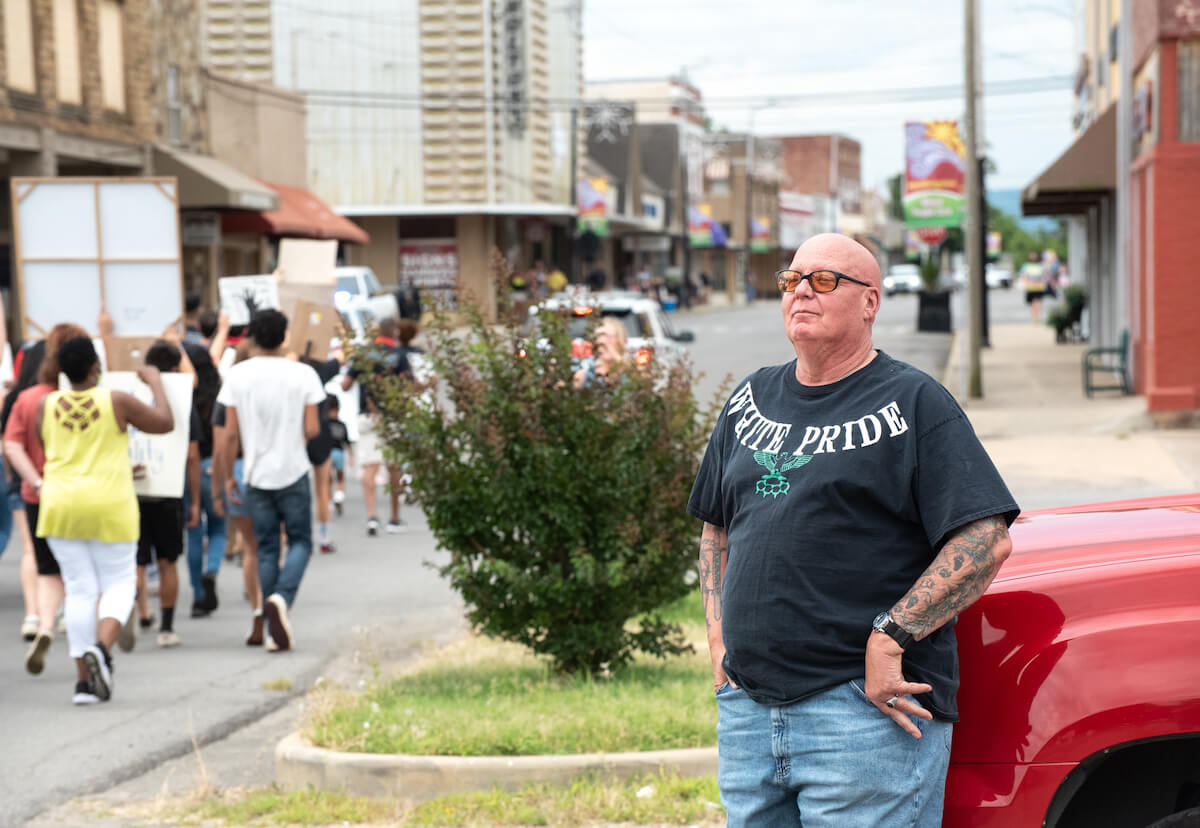
Saturday’s entire event was peaceful in Poteau. Organizers praised local police for their cooperation and assistance.
Poteau police patrol cars escorted the marchers across the four busy lanes of State Highway 59 and down Dewey Avenue. About a dozen law enforcement officers stood or were parked at intersections to block vehicular traffic.
The march took the group past the old downtown bank — once robbed by the infamous Bonnie and Clyde in 1932 — and past a local hotel converted to the LeFlore County Museum, where upstairs exhibits are dedicated to the lives of Poteau’s two most prominent residents: U.S. Sen. Robert S. Kerr and Dr. Montgomery.
A couple of drivers passing by the LeFlore County Courthouse during the speeches slowed and yelled “Trump 2020,” but no racist epithets were heard during the event, which coincided with the early hours of President Donald Trump’s campaign rally about 120 miles northwest in Tulsa.
Randolph’s remarks made no reference to small gatherings of persons who had been waving Trump flags along Poteau’s downtown street when the marchers had passed. There was no interaction between them and the marchers.
Jim Berngen, a Poteau man standing by himself and wearing a “White Pride” T-shirt, watched the protesters march by. For a moment, he appeared to be taking photographs of the marchers with his cellular flip-phone.
“I’m just here to peacefully observe,” Berngen said.
It appeared the marchers made a point of ignoring him.
‘It’s a wide range of people who are concerned’
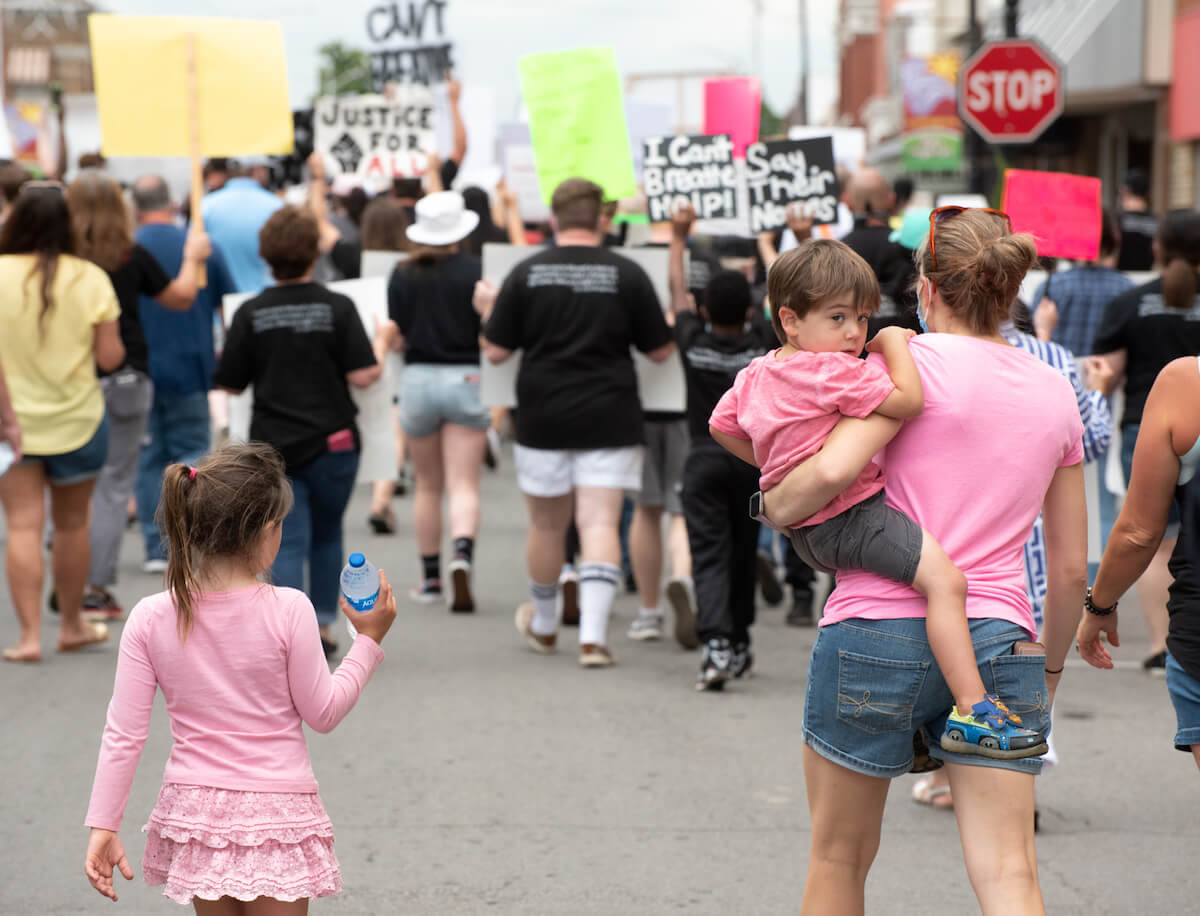
Organizers had been unsure whether opposition would show up. When plans for the Poteau March for Justice were announced on social media, some people told Katie Hopper, a Poteau High School art teacher who helped Carpenter plan the event, that it was not a good idea.
“But this has been great,” Hopper said, looking over the people of various ethnicities and ages. “We’ve had a great turnout. It’s a wide range of people who are concerned about those who are living at risk.”
Hopper’s late father, Dr. Joe K. Thomas, was a Poteau dentist for 51 years. Hopper said that during her father’s early years in Poteau some criticized him for treating Black dental patients, too.
“He did it because it was the right thing to do,” she said, even though her father lost business because of it.
Organizers also had voter registration and absentee ballot applications available Saturday, encouraging those in attendance to not stop with just a march down a street.
“If we just show up here and fail to show up at the voting booth, none of this will matter,” said Naomi Andrews.
Also attending the rally was Danyell Lanier, the lone Democratic candidate for Oklahoma’s 2nd Congressional District. In November, Lanier will face the winner of the June 30 Republican primary, which is expected to be incumbent U.S. Rep. Markwayne Mullin. He was in Tulsa on Saturday at Trump’s rally.
Lanier, a Navy veteran who is black and a citizen of the Cherokee Nation, said the Poteau march signals a difference in public attitude toward race and equality in southeastern Oklahoma. But, she said, she is realistic, too.
“I know I’m going to have an uphill battle, being a person of color — an Indigenous Black in rural Oklahoma,” she said. “But it’s time.”
No Black person has ever been elected to a congressional seat in the district.
Saturday’s rally came to a close with a moment of silence that lasted eight minutes and 46 seconds — the time frame of George Floyd’s arrest in Minneapolis which led to his death and the recent numerous protests that have enveloped the country.
Some kneeled, some lay prone on the ground and most bowed their heads in silence, including one man in the back of the crowd wearing a bright red Make America Great Again hat.
More photos from the Poteau March for Justice










